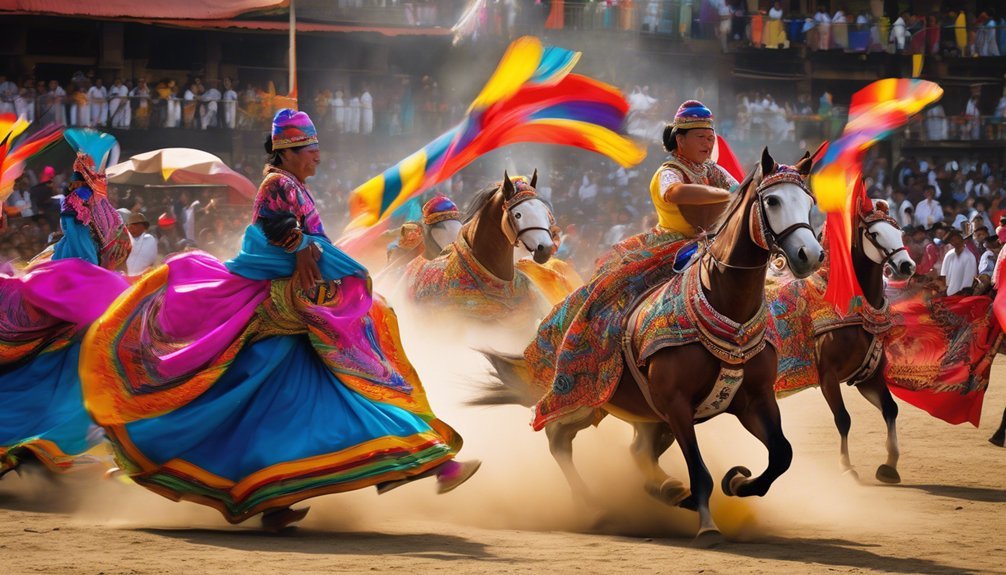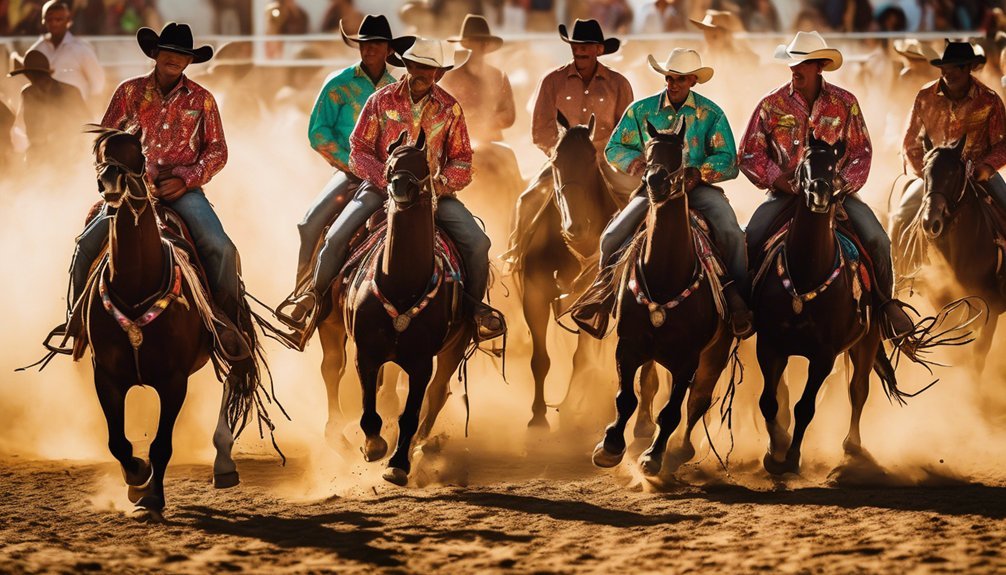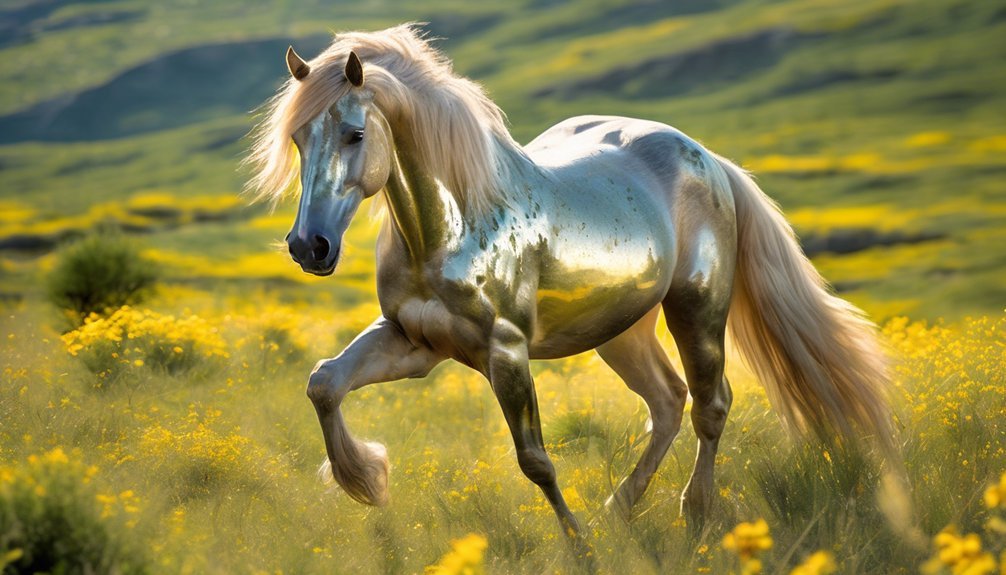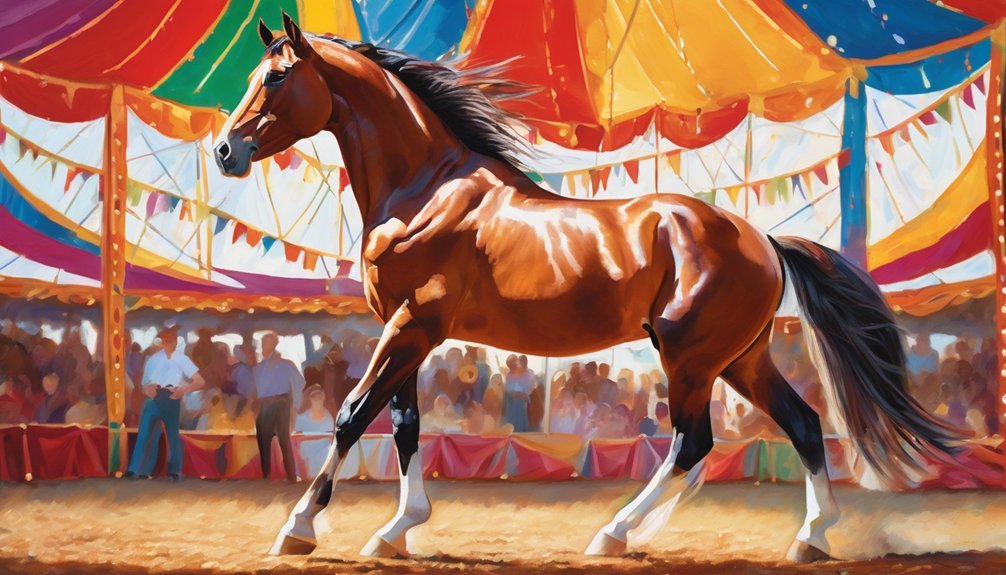
Horses have a unique way of weaving themselves into the fabric of cultural festivals across the globe. You might notice their presence in parades, races, and rituals, each showcasing the deep connections between communities and these majestic animals. As you explore various celebrations, consider how horses not only symbolize heritage but also enhance communal bonds. What lies beneath this enduring relationship, and how does it shape the identity of these festivals?
Key Takeaways
- Horses symbolize cultural identity and heritage, enriching the atmosphere of festivals and connecting communities to their traditions.
- Events like Spain's Feria De Abril highlight the bond between horse and rider, showcasing vibrant traditions through costumes and music.
- Mongolian Naadam features horseback races that embody national spirit, with young jockeys representing a deep connection to heritage.
- Native American powwows celebrate horses as spiritual guides, fostering community connections through traditional riding competitions.
- The Scottish Highland Games emphasize horses' historical significance, featuring activities like cart races that showcase local equestrian culture.
The Majestic Equine in Spanish Feria De Abril
As you wander through the vibrant streets of Seville during the Feria de Abril, it's impossible not to notice the majestic horses that gracefully parade through the festival.
These flamenco horses, adorned in colorful costumes, embody the spirit of Andalusian culture. You can feel the excitement in the air as riders skillfully maneuver their steeds, showcasing the deep bond between horse and human.
Each parade tells a story, intertwining tradition with the lively atmosphere of the festival. The rhythmic sound of hooves against the cobblestones harmonizes with the flamenco music, creating an unforgettable experience.
Observing this spectacle, you realize that these horses aren't just participants; they symbolize heritage, pride, and the rich tapestry of Spanish life, captivating everyone who witnesses their elegance.
Equestrian Traditions at the Mongolian Naadam
With the vast steppes of Mongolia as a backdrop, the Naadam Festival showcases equestrian traditions that are deeply woven into the fabric of Mongolian identity.
You'll find the spirit of the nation embodied in the thrilling Mongolian horseback races, where young jockeys, often as small as the horses themselves, navigate the rugged terrain.
The Naadam rituals surrounding these races are steeped in history, celebrating not just speed, but the bond between horse and rider.
As you watch, you can sense the pride radiating from families who prepare their horses meticulously for this grand event.
Each gallop echoes centuries of tradition, reminding you that in Mongolia, horses aren't merely companions; they're a lifeline to culture and heritage.
The Role of Horses in Native American Powwows
When you attend a Native American powwow, you can't help but notice the horses' powerful presence, embodying deep spiritual significance within the community.
These majestic animals often participate in traditional riding competitions, showcasing the skills and cultural heritage passed down through generations.
As you observe the intricate relationship between the horses and the people, it becomes clear that they play a vital role in honoring traditions and fostering community connections.
Spiritual Significance of Horses
Horses hold profound spiritual significance in Native American culture, particularly during powwows, where they embody strength, freedom, and a deep connection to the earth.
You can feel the energy shift as these majestic creatures enter the arena, their movements steeped in spiritual symbolism. Each horse represents not just a mode of transport but a bridge to the sacred, echoing themes found in equine mythology.
As you watch dancers honor the horses, it's evident that these animals are seen as spiritual guides, connecting the material and spiritual worlds. Their presence stirs a collective reverence, reminding everyone of nature's power and beauty.
For many, horses aren't merely participants; they're revered beings that facilitate a deeper understanding of existence and community.
Traditional Riding Competitions
As you immerse yourself in the vibrant atmosphere of a Native American powwow, the thrill of traditional riding competitions captivates both participants and spectators alike.
These events showcase a rich tapestry of riding styles and competition formats, reflecting cultural heritage and connection to the land.
- Barrel Racing: A test of speed and agility, where riders weave gracefully around barrels.
- Relay Races: Teams demonstrate teamwork and precision as they pass the baton while riding.
- Bridleless Riding: A showcase of skill, where riders navigate courses without reins, emphasizing trust between horse and rider.
Each competition not only entertains but also honors the deep relationships forged between horses and their riders, creating a profound sense of community.
Celebrating the Andalusian Horse in Jerez
While you stroll through the vibrant streets of Jerez, the majestic Andalusian horse takes center stage, embodying the region's rich equestrian heritage.
You can't help but admire the elegance of these magnificent creatures, showcased in parades and competitions that highlight their beauty and skill. The local festivals brim with life, where equine artistry comes alive through intricate choreography and passionate performances.
As riders clad in traditional attire guide their horses, you feel the deep connection between man and animal, a bond steeped in tradition. Each movement reflects centuries of training and dedication, celebrating not just the horse, but the culture itself.
In Jerez, you experience a living tapestry of Andalusian heritage, woven together through the rhythm of hooves and the spirit of celebration.
The Influence of Horses in the Brazilian Festa Do Peão

At the Festa Do Peão, horses aren't just participants; they're central to the festival's identity.
You'll notice how traditional rodeo events showcase both the skill of the riders and the deep-rooted cultural ties to these majestic animals.
This celebration not only honors equine heritage but also boosts the local economy, reflecting the vital role horses play in this vibrant community.
Traditional Rodeo Events
Horses play a pivotal role in the Brazilian Festa do Peão, where the thrill of traditional rodeo events captivates both participants and spectators alike.
You can feel the energy as the crowd gathers to witness the rich rodeo history, deeply intertwined with cowboy culture.
Here's what makes these events unforgettable:
- Bull Riding: Experience the adrenaline rush as skilled cowboys showcase their talents, balancing on powerful bulls.
- Team Roping: Watch as pairs of cowboys demonstrate their precision and teamwork, a true testament to their bond with horses.
- Barrel Racing: Enjoy the speed and agility of horses as they navigate barrels, showcasing their training and the rider's skill.
Each event offers a glimpse into the heart of Brazil's vibrant rodeo tradition, celebrating the enduring connection between horses and culture.
Cultural Significance of Horses
The vibrant atmosphere of the Festa do Peão embodies the deep cultural significance of horses in Brazilian society. Here, horses aren't just animals; they symbolize strength, freedom, and the spirit of the cowboy. Their role in equine mythology resonates deeply, intertwining with the folklore and traditions of the region.
| Cultural Symbolism | Equine Mythology |
|---|---|
| Horses represent resilience | Linked to legends of bravery |
| Icons of rural heritage | Spirits guiding the lost |
| Celebrated in music and dance | Emblems of unity and community |
As you observe the festivities, you can feel the connection between people and these majestic creatures, a bond that transcends mere utility, becoming a celebration of life itself.
Impact on Local Economy
While immersing yourself in the lively atmosphere of the Festa do Peão, you can't help but notice how integral horses are to the local economy. Their presence not only enriches the festival experience but also drives significant economic benefits and tourism growth.
- Increased Visitor Spending: Tourists flock to the event, boosting local businesses like hotels, restaurants, and shops.
- Job Creation: The festival generates employment opportunities in various sectors, from event management to equestrian training.
- Cultural Promotion: The unique equestrian events attract media coverage, showcasing the region and drawing even more visitors.
In essence, horses are more than festival stars; they're vital to the community's financial vitality and cultural identity.
Horses and Heritage at the Scottish Highland Games
At the Scottish Highland Games, where tradition and celebration intertwine, horses play a pivotal role in showcasing the region's rich cultural heritage. You can feel the excitement as majestic Clydesdales and spirited ponies take center stage, embodying the strength and spirit of Scotland.
Their presence isn't just for show; they connect you to centuries of Scottish heritage, reminding you of the importance of these magnificent animals in rural life. You might watch horse-drawn cart races or admire the skills of riders navigating obstacles, each event steeped in history.
As you absorb the sights and sounds, you realize that these horses help preserve stories of the past, uniting participants and spectators alike in a celebration of identity and community.
Frequently Asked Questions
What Are the Health Benefits of Horseback Riding for Festival Participants?
When you ride, you boost your physical fitness and enhance your mental wellbeing. The rhythm of the horse beneath you invigorates your body, while the connection fosters emotional balance, creating a truly enriching experience.
How Are Horses Cared for During Large Cultural Festivals?
You might think caring for horses during festivals is simple, but it requires careful grooming techniques and thoughtful festival logistics. Observing the bond between caretakers and horses reveals a deeper connection woven into the event's fabric.
What Is the Historical Significance of Horses in Different Cultures?
You'll find that horses embody deep equestrian symbolism across cultures, representing strength, freedom, and nobility. Their historical traditions, woven into tales and rituals, reveal a profound connection between humanity and these magnificent creatures throughout time.
Are There Any Endangered Horse Breeds Featured in These Festivals?
Yes, you'll find endangered horse breeds showcased in festivals, emphasizing their cultural significance. These breeds often symbolize heritage and tradition, reminding you of the fragile connection between humans and these magnificent creatures throughout history.
How Do Cultural Festivals Promote Horse Welfare and Responsible Ownership?
Cultural festivals promote horse welfare by offering horse education and emphasizing responsible breeding. You'll see passionate advocates sharing knowledge, which inspires attendees to prioritize the well-being of these magnificent creatures, fostering a deeper connection and commitment.
Conclusion
As you witness the vibrant celebrations where horses dance through the streets and fields, remember they're not just animals; they're living bridges connecting past and present. Each gallop echoes stories of heritage, unity, and pride. Just like the threads woven into a tapestry, these majestic creatures intertwine cultures, reminding us that our identities are shaped by shared experiences. Embrace the spirit of these festivals, and you'll find that in celebrating horses, you're also celebrating the heart of community itself.





